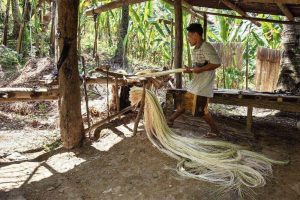A small but dedicated group of fashionistas are working relentlessly to cut animal suffering and climate pollution from the industry — with innovations ranging from mushroom-derived leather to silk made from orange peels, Mongabay reports.
Leather and wool cruelly taken from farmed animals is a leading cause of deforestation and biodiversity loss, including in the Amazon rainforest, according to Mongabay. In fact, a report by Center for Biological Diversity and Collective Fashion Justice’s CIRCUMFAUNA initiative found that the climate cost of wool from sheep is on average three times the negative environmental impact of acrylic and it’s five times worse than conventionally grown cotton.
The fashion industry also routinely produces up to 10 percent of annual global carbon emissions and 20 percent of worldwide wastewater, according to a report from the Ellen MacArthur Foundation.
Farms that raise animals for their skins also create intensive suffering for furbearers, while also becoming hot spots for human health hazards — as the COVID-19 pandemic tragically illustrated.
Fashion designers, including Carmen Hijosa, have taken note of the detrimental impacts of pursuing their passions by doing “business as usual” and have instead pledged to do their part for a healthier tomorrow.
Hijosa spent more than a decade as a designer and “luxury” leather product consultant, until a tour of a tannery in the Philippines — and the exposure to more humane alternatives in the same country — forced her to switch up her approach.
Producers of newly made leather, derived from animal skins, often treat their products with cancer-causing chemicals to prevent the skins from decomposing. But in a nearby area, Hijosa viewed producers using pineapple-leaf fibers to create handwoven textiles.
She has since founded the London-based startup Ananas Anam and Piñatex, whose fabric is now sold in more than 80 countries.
“Sustainable materials are pivotal if we are to transform the fashion industry from one of the most polluting industries to one that is transformative, regenerative and more humane, caring both for the environment and the people it touches in its complex supply chain,” Hijosa told Mongabay.
Another cutting-edge innovator is Swiss company QWSTION, which is using abacá, derived from the banana family, to create durable outdoor gear and clothing through its Bananatex project, founded in 2018.

Abacá. ( Image courtesy of Sonja Mayrhofer/QWESTION).
Meanwhile, plant-based alternatives to animal-derived leather are underway through the U.S.-based Mylo brand, of the Bolt Threads company, which uses fungi-derived mycelium, and through Vegea, an Italian-based company that uses grape skins, seeds and stalks discarded during the wine-making process.
Italian brand Orange Fiber is making a plant-based alternative to silk from oranges, while Germany-based company Algaeing is creating threads and textiles from algae and other plants during the finishing process.
Even more compassionate alternatives to wool are possible, with Colombian university students picking up the Biodesign Stella McCartney and PETA Prize for Animal-Free Wool with their WOOCOA design using coconut and hemp fibers and mushrooms.
A recent report from the Material Innovation Initiative detailed 74 companies committed to these conscious choices. While that number is relatively small, compared to the millions of companies out there, it’s a 5-fold increase within the last two years, according to the report.
While the innovators noted additional work is needed to bio-proof their products – including finding solutions for using petroleum-based products to strengthen their fabrics or cut down fuel-burning associated with transporting products to different countries during production – we applaud their tireless work to create a more compassionate fashion of the future.
We also applaud the animal rights activists, the environmental organizations, and the conscious consumers who demanded an alternative to cruelly-sourced animal products — and so led to a need for these more compassionate actions.
Everyone can help save the planet and animals’ lives by always leaving the furs and skins of animals out of their wardrobes and opting for kind, vegan clothing instead.
Abacá. ( Image courtesy of Sonja Mayrhofer/QWESTION).






